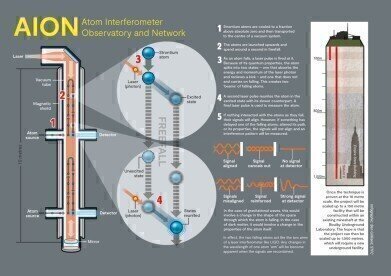News & Views
Consortium Seeks to Expand Fundamental Physics Research
Feb 08 2021
The Science and Technologies Facilities Council, (STFC) has provided £7.2m of initial funding to the Atom Interferometry Observatory and Network (AION), an interdisciplinary mission that will harness cold atom technologies to address key issues in fundamental physics, astrophysics and cosmology that can be realised in the next few decades.
The AION consortium, led by Imperial researchers, will enable a ground-breaking search for ultra-light candidates for dark matter – a mysterious substance that makes up 85% of the ‘missing’ matter of the universe – and also pave the way for the exploration of gravitational waves – ripples in spacetime created by huge astronomical events. An interdisciplinary team at STFC’s Rutherford Appleton Laboratory, will be responsible for the design and build of a 10-metre atom interferometer that will advance understanding of dark matter and enable observation of gravitational waves in an entirely new frequency range.
This will be the first large-scale atom interferometer in the UK and will pave the way for larger-scale experiments in the UK in the future. Members of the consortium will also contribute to MAGIS, a partner experiment situated at the Fermi National Laboratory in the USA, networking the two instruments together.
The AION project is a consortium led by Imperial College London and includes the University of Birmingham, the University of Cambridge, Kings College London, the University of Liverpool, the University of Oxford, and the STFC Rutherford Appleton Laboratory.
In addition, the project is in partnership with UK National Quantum Technology Hub in Sensors and Timing, Birmingham, UK, the MAGIS Collaboration, US, and the Fermi National Accelerator Laboratory, US.
The new funding will also establish for Imperial a leading role in large-scale atom interferometry for fundamental physics research, as the AION consortium looks towards possible 100m- and km-scale terrestrial detectors as well as a future space mission.
Digital Edition
Lab Asia 31.2 April 2024
April 2024
In This Edition Chromatography Articles - Approaches to troubleshooting an SPE method for the analysis of oligonucleotides (pt i) - High-precision liquid flow processes demand full fluidic c...
View all digital editions
Events
Apr 24 2024 Jakarta, Indonesia
Apr 25 2024 Istanbul, Turkey
Apr 28 2024 Montreal, Quebec, Canada
May 05 2024 Seville, Spain
InformEx Zone at CPhl North America
May 07 2024 Pennsylvania, PA, USA


















